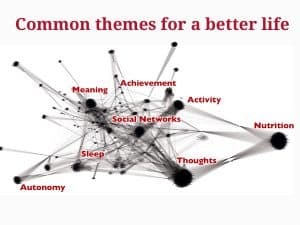Tina Hallis's Blog, page 27
June 3, 2018
How to Reach Your Big Potential – By helping others get what they want

You can have everything in life you want, if you will just help other people get what they want. – Zig Ziglar.
It’s been strange how many times this idea has shown up in recent books and articles I’ve been reading! For example, Shaw Achor’s latest book, Big Potential, talks about new studies from neuroscience and psychology that show how our potential is more than just our individual talents and effort. It’s more accurately determined by how we complement, contribute to, and benefit from the abilities and achievements of people around us.
I love this! It’s really about having an abundance mindset where we lift ourselves up by lifting up those around us. This is in contrast to a competitive, scarcity mindset where we need to better ourselves at the expense of others because there’s only so much business, good grades, success, and happiness in the world.
Based on his research and experience, Shawn recommends 5 ideas to create Big Potential in our lives. Using the acronym SEEDS, they are –
SURROUND yourself with a star system – those people who lift you up and bring out your best.
EXPAND your power by empowering others. Helping others reach their potential benefits you in the long-term.
ENHANCE your resources by becoming a Prism of Praise – spread your praise wider to include the team and journey that made the success possible, rather than just one person.
DEFEND your system against negative attacks. Build your positivity using strategies like gratitude, learning from mistakes, and seeing challenges as opportunities.
SUSTAIN your gains by fueling the Virtuous Cycle. Visualize a brighter future and celebrate wins.
I’m grateful for the special people in my life who are living examples of this phenomenon and who inspire me to keep building my abundance mindset.
What steps could you take this week to add one or more of these SEEDS to your life? Who can you help to grow, learn, and succeed in their lives?
May 27, 2018
Right now, in this moment, are you happy?

Right now, in this moment, are you happy? Here’s an interesting concept –
Happiness only happens in the present moment.
And our ability to be happy right now is influenced by our current thought.
If we buy something, let’s say a new car, we may think it will bring us more happiness, but that’s only true when we’re thinking about it. If we’re driving our fabulous new car but focused on a frustrating conversation we had, it’s not adding to our happiness in that moment.
I’ve been experimenting with this fascinating idea this past week. For example, I love to go for walks. But my ability to enjoy my walk can be ruined if I spend that time focused on something I’m worried about or something that’s made me upset. On the other hand, if moment by moment I’m noticing the scenery, enjoying being outside, or even thinking about something that I like, my happiness level is much higher.
Your brain is a lot like your other organs. Just like your heart, lungs, and liver, it functions without any input from you. You don’t need to tell it to think. It’s constantly churning out thought after thought. There are estimates suggesting we have anywhere from 20,000 to 80,000 conscious thoughts per day. But similar to your lungs, where you can control your breath, slowing it down, making it deeper, or even holding it, you can also control your thoughts. It may not always be easy, and it requires attention and effort.
If you leave your brain to its default mode, it will likely spend most of its time thinking about problems, worries, past dramas, and things you don’t like. Although this is an important part of our survival instinct, if you want to be happy in this moment, you may need to intentionally choose a thought that makes you feel good.
This week, use a trigger that will help you notice your current thought so you can decide if you want to change it. You can –
Set alarms on your device reminding you to tune into your thoughts,
Create a password that will remind you,
Use a common activity as a reminder (such as every time you open the refrigerator door . . . )
Use a visual reminder such as a note on your mirror, stop signs, etc.
Use a physical reminder such as a piece of jewelry or a coin or stone in your pocket
May 20, 2018
8 Common Themes for a Better Life – Taking care of your mind & body

In addition to reading and learning about Positive Psychology, I’m also intrigued by the latest science related to cancer, Alzheimer’s, diabetes, heart health, nutrition etc. As I look into the recent thinking in these areas, I’m amazed at common themes that keep surfacing again and again, whether it’s information on treating diseases, how to be healthier, or how to be happier. Recent findings reinforce the strong connection between our mind and body. If we want to feel great, inside and out, we need to take care of both.
The themes that keep showing up for a better life are :
Nutrition – Making healthy choices for what we eat such as cutting back or eliminating sugar, white flour, adding more non-starchy vegetables, berries, seeds, nuts, fish, etc.
Activity – Staying active and moving to keep our blood pumping every day in ways that work for us
Sleep – Finding and using the individualized sleep pattern that works best for us
Social Networks – Building connection by spending time with people we care about and who care about us, that support and encourage us and help us be our best
Thoughts – Choosing thoughts that help us cultivate positive emotions such as hope, gratitude, optimism, curiosity, calm and not getting stuck in negative emotions
Autonomy – Finding ways to take control of our lives instead of feeling like a victim
Meaning and purpose – Making sure that our lives contain a reason to get up in the morning, big or small
Achievement – Learning and growing by getting outside our comfort zone to build our self-confidence and self-credibility
Could any of these areas use a little more attention in your life? Remember, it’s not about being perfect in each area, but about working towards a better balance.
May 12, 2018
Working Hard at Raking the Yard – Why Nobody Noticed

The lawn was full of gravel, sticks, and leaves so I decided to tackle some raking instead of going for a walk. It was tiring work, and I had to stop and give my arms a break now and then. I was making great progress and the yard was looking much better.
Even though I was feeling good about the difference, it occurred to me that my husband and daughter wouldn’t even notice. Did that mean they were ungrateful or uncaring?
It’s easy to feel hurt and unappreciated when other people don’t thank us, or at least comment on our hard work. We may wonder how they can be so blind. Has this ever happened to you?
What I’ve learned has really helped me understand why this happens (and not to feel offended when others don’t notice). Our brains are wired to “see” anything that’s out of the ordinary. If everything appears to be as our brain expects it, (the lawn looks nice like it normally does) then there is nothing different to notice. But if something is out of place like an unusually messy kitchen, messy bedroom, or messy yard, our brains zoom in. Or if something is normally a mess, but now it’s organized and clean (like my office) our brains pay attention to the difference. “Wow! That’s looks so nice!”
What this insight has taught me is that if I want someone to appreciate my work, I need to point it out instead of feeling unappreciated. “See how nice the yard looks?” Remember all the gravel and leaves? I spent an hour raking today.” I also realize that there are many things my family does that I don’t notice either, so I encourage them to tell me.
Give it a try! Instead of feeling hurt or frustrated that your efforts go unnoticed, point them out. And be sure to let others know about this phenomenon and ask them to let you know about their hard work.
The Guy Just Stood There, Not Helping & I Was in a Hurry. Judging Others

The other day I was in the checkout line at the store, and I was in a rush. I had to hurry to get to school to pick up my daughter because she would be worried and irritated if I was late. Yet here, in front of me was an elderly couple, moving extremely slow.
The man was standing, just holding on to the cart, while the woman s – l – o – w – l – y emptied the cart, and then s – l – o – w – l – y wrote out her check and then s – l – o – w – l – y bagged her items. I impatiently watched and wondered with frustration why the guy just stood there and didn’t help. What was wrong with him? They didn’t look that old.
I have a long way to go, but I have gotten better at catching myself judging others. It’s a natural, instant reaction to make a judgment about other people based on how they’re dressed, how they look, and how they behave. It’s part of our survival instinct to help us quickly recognize people who are not from our “tribe” and who may be a threat. Because it’s instinctive and can happen so fast, we might not even notice it.
But I noticed my judgment kicking in, and I thought how I didn’t know anything about their situation or what might be going on with the man.
As they FINALLY finished and started walking away so I could pay for my items, I had a strange sensation in my stomach. With much chagrin, I realized why the man had just been standing there. He wasn’t being mean or irresponsible – he was blind. It was such a strong reminder that I need to catch myself judging. I need to challenge my assumptions. I need to realize I will never know the entire story.
Does this sound familiar? Just think of how a little more self-awareness could help us all be more tolerant, patient, and open-minded – all things the world could really use a little more of right now.
Be on the lookout this week. Try to notice moments when you make assumptions about other people based on how they look or what they do.
Related tip
April 25, 2018
The Best Sleep Aid: Try a little gratitude to calm your mind

Do you ever have trouble falling asleep? Or maybe you wish you had more peaceful sleep?
I’ve found that practicing a little gratitude before I go to sleep is a great way to calm my mind and have more positive thoughts as I drift off.
For example, the other night as I laid in bed, I thought of how I was grateful for my husband and his support and love. I thought of how I was grateful for my daughter and her wisdom and perseverance. I thought of how I was grateful for my parents and their encouragement. I thought of other family members and how they enrich my life. I thought of how I loved my home and where I lived. I thought of how grateful I am to be doing work I love and care about. I was even noticing how much I appreciated my warm, soft bed with its fleece sheets. My mind was becoming less busy and stressed so I could relax.
There are even a variety of studies that demonstrate how gratitude can help us get to sleep faster and sleep longer.
This night, as I was savoring the many good things in my life, it hit me how wonderful my life truly is. Yet it’s easy for me to lie in bed and focus on things that I wish were different, things I don’t have, and things that went wrong. If I let myself go down that path, my life doesn’t seem so wonderful. My mind feels tense as it focuses on things that aren’t fair, that are hard, and that I don’t like, and when that happens, I can become blind to all the good that surrounds me. It reminds me of one of my favorite quotes by the author, Colett—
“What a wonderful life I’ve had, I just wish I’d realized it sooner.”
Give it a try tonight. Spend a few minutes in bed feeling grateful for the many good things in your life and see if it’s easier to get to sleep.
September 3, 2017
The Power of Practice – Improving Our Positivity Is Like Biking Up Hills
I really enjoy living in the Baraboo bluffs – except when it comes to biking. Either direction I turn out of my driveway, I have major hills to tackle. I love bicycling, but these hills kick my butt! I know they would get easier if I would bike them more often, but they are just plain hard and not fun, so I don’t practice as much as I’d like. I sometimes wish I had a route with smaller hills that could help me build up my endurance and strength for these bigger challenges.
These were the thoughts running through my head today during my bike ride, and it hit me how the same approach holds true for increasing our positivity. If it’s something we want to get better at, we need to practice.
But trying to practice staying positive during the big challenges in our life can be hard. Instead, we can practice being grateful and seeing the good stuff when it’s easier to build up our positivity “muscle.”
I remember hearing the analogy that learning to be more positive is like going to the gym. You start with the lighter weights and build up to the harder exercises over time. As you workout, it gets easier to lift the heavier weights, but it takes time. The key is to keep practicing and noticing the improvements along the way.
I’ve definitely seen improvements in my life. I have a long way to go, but the great thing is that practicing gratitude, pausing to savor, trying to learn from challenges, and noticing the good in the world is actually enjoyable, at least when life is not kicking me in the butt. How are you going to practice increasing your positivity this week? Here are some ideas to get you started.
To get more Positivity Tips like this delivered to your inbox, sign up here.
Tina Hallis, Ph.D. is Chief Positivity Officer of The Positive Edge, a company dedicated to helping people and organizations increase their positivity to improve the quality of people’s work lives and the quality of company cultures. She is certified in Positive Psychology, an authorized partner for Everything DiSC®, and a Professional Member of the National Speaker’s Association
The post The Power of Practice – Improving Our Positivity Is Like Biking Up Hills appeared first on The Positive Edge.
August 27, 2017
Are You a Master at the Art of Worrying?
Worry is a strong trait that runs in my family. My grandma was a master worrier. She would get incredibly anxious when any family or friends were sick or traveling. You always had to call when you got to your destination so she knew you were safe.
I can remember worrying as a kid. What if someone breaks into our house while we’re sleeping? What if the house burns down? What if no one asks me to dance?
I see it in my daughter. Last night she slept on the couch because she was worried there might be wood ticks in her bed since the cat had been sleeping there. (She knew the cat had been sleeping on the couch, too.) She definitely worries a lot about ticks.
I don’t remember where I stumbled upon this message, but it has totally shifted my relationship with worry. Worrying about something won’t stop it from happening.
A few years ago, I read this wonderful and wise quote by Leo Buscaglia,
“Worry never robs tomorrow of its sorrow, it only saps today of its joy.”
Sure, we can use our worry to take precautions and mitigate the risk of it happening. But after we’ve checked the sheets for ticks and put the cat outside, we have to decide to stop worrying.
Sometimes I find it helpful to have a conversation with myself and question the chances of my worry actually happening. Am I wasting my energy (and losing sleep) for no reason or benefit? Is worrying actually going to change anything? How can I shift my thinking and focus on something else more positive like a favorite memory, something I’m grateful for, or something I’m looking forward to?
I like Mark Twain’s quote,
“I’ve had a lot of worries in my life, most of which never happened.”
Practicing this approach has made a big difference for me. Now, when I have something in my life that makes me worried, I can more easily put it out of my mind (after I’ve taken any necessary precautions) and shift my thoughts to something more positive.
What worries are sapping your energy? Based on this approach, what would a conversation with yourself about this worry look like?
To get more Positivity Tips like this delivered to your inbox, sign up here.
Tina Hallis, Ph.D. is Chief Positivity Officer of The Positive Edge, a company dedicated to helping people and organizations increase their positivity to improve the quality of people’s work lives and the quality of company cultures. She is certified in Positive Psychology, an authorized partner for Everything DiSC®, and a Professional Member of the National Speaker’s Associati
The post Are You a Master at the Art of Worrying? appeared first on The Positive Edge.
August 20, 2017
Stressed at Work? Ditch the Drama Already
The average workday for many professionals is full of challenges and demands, whether that means meeting tight deadlines, sitting in back-to-back meetings or fielding client requests. As a result, you probably come home exhausted and drained at the end of the day.
If this sounds familiar, rest assured you’re not alone. Daily responsibilities and duties can certainly be stressful, but what happens when your stress is compounded by unnecessary thoughts or emotions in the workplace?
After more than 20 years in human resources, I’ve certainly witnessed my share of professionals spending too much time on drama at work — creating fictional stories in their heads and wasting time and energy arguing with the reality or facts of their situations. We are all guilty of it on some level, and I’m certainly no exception. The unfortunate truth is that you are engaging in a self-inflicted argument that you are 100 percent certain to lose. You will never be able to fully control every situation and there will always be extenuating circumstances. That’s why you must embrace what is and find ways to succeed anyway, regardless of any obstacles along the way.
The good news is that you do have the ability to recapture that time and use it to make a more positive impact at work — all while decreasing stress. This can be achieved by recognizing and ditching these three common habits that are nothing more than a drain on your time, energy and productivity at work:
1. Stop arguing with reality.
Many professionals have adopted a flawed pattern of thinking. They’ve come to believe that they would be happier or more effective if only their circumstances were different. My advice? Don’t follow this pattern. Stop playing the victim, accept that which is beyond your control and focus on how you can succeed in spite of your challenges.
2. Ditch the drama.
The majority of stress is usually self-imposed. The truth is that your reality is never as harsh as you think it is. For example, what if a client has several last minute changes to a proposal you sent them? You may take it as a sign that they don’t like your ideas or value your work. But if you back out of that story, all you know for sure is that they needed edits made at the last minute.
Consider this: What if they had been traveling and didn’t have time to review it sooner? What if their goals had changed for the project? In these situations, you must ask yourself, “What do I know for sure to be true?” It’s a great way to edit your story and get back to the facts. Stop believing everything you think, and use your energy in a way that serves — not sabotages — your career.
3. Remember, suffering is not mandatory.
There are two ways to go through a busy day — with joy or suffering. You must make a point to consistently call yourself to greatness, otherwise you run the risk of getting caught up in the negative banter. When there’s a full schedule for the day, will you default to suffering? Is your day really ruined by a late order or last-minute meeting? Make it a habit to choose joy, and stop viewing what is in front of you as a source of pain and stress. Instead, consider it a new opportunity with new possibilities for self-growth.
We all have pressing circumstances and responsibilities in life. But if you want to be more productive, have less stress and free up precious energy at work, stay grounded in reality. Resist the urge to feed into drama and other self-sabotaging habits, and work to conserve your energy for making an impact within your company. The rewards will be worth it — for you and your organization.
For more about Cy Wakeman, check out RealityBasedLeadership.com and learn about her new book, No Ego, coming out next month.
To get more Positivity Tips like this delivered to your inbox, sign up here.
Tina Hallis, Ph.D. is Chief Positivity Officer of The Positive Edge, a company dedicated to helping people and organizations increase their positivity to improve the quality of people’s work lives and the quality of company cultures. She is certified in Positive Psychology, an authorized partner for Everything DiSC®, and a Professional Member of the National Speaker’s Association
The post Stressed at Work? Ditch the Drama Already appeared first on The Positive Edge.
August 13, 2017
Four Strategies to Help You Achieve Your Goals
A couple of weeks ago, I found out that I’m no longer pre-diabetic, but have reached the stage of having the real deal. Suddenly my nutrition goals have changed. In the past few years, I’ve paid closer attention to what I eat and have tried to choose healthier foods, but now I need to take it to a whole new level if I’m going to avoid taking medication. Here are a few insights that are helping me that I wanted to share that can apply to many goals.
When I tell people of my goal and why, they are very supportive. It also helps hold me accountable because if I say I’m watching my carbs, I feel more motivated not to be seen eating a donut.
If I say to myself, “I’m not going to eat candy when I want a snack.” I’m still thinking about candy because that’s the word my brain sees. Instead, I rephrase it to, “I’m going to eat some nuts when I want a snack.” Now the word (and temptation) of candy is gone.
I plan ahead for possible challenges. We’re having a birthday party for my daughter this weekend. There will be so much good food, including jello salad, potatoes, buns, and, of course, birthday cake. Mmmmm!! But these are high in carbs so I need to make sure there will be some foods I love that I can eat like freshly steamed green beans, caprese salad, cherry tomatoes from the garden, and dark chocolate covered almonds.
I think about my “Why.” I’m now 50 years old and notice my age creeping in some days. I want to stay active and be able to enjoy life and do things with my daughter and husband. I need to take care of my body and help it stay healthy if I’m going to be ready for adventures like a backpacking trip to Alaska in the next couple of years.
On the one hand, I’m frustrated by having to pay so much attention to the food I eat. It’s inconvenient and takes extra preparation and planning. On the other hand, it’s a great motivator to help me really eat healthy, which will have many benefits besides managing my diabetes. It’s also helped me make exercise a higher priority.
Having the right goals and making progress towards them can increase our happiness and feelings of control. Think of a goal you have. How could you use these strategies to make achieving it easier?
To get more Positivity Tips like this delivered to your inbox, sign up here.
Tina Hallis, Ph.D. is Chief Positivity Officer of The Positive Edge, a company dedicated to helping people and organizations increase their positivity to improve the quality of people’s work lives and the quality of company cultures. She is certified in Positive Psychology, an authorized partner for Everything DiSC®, and a Professional Member of the National Speaker’s Association
The post Four Strategies to Help You Achieve Your Goals appeared first on The Positive Edge.



